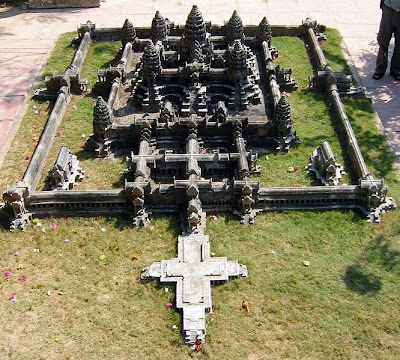Angkor Wat (Khmer: អង្គរវត្ត) is a temple complex at Angkor, Cambodia, built for the king Suryavarman II in the early 12th century as his state temple and capital city. As the best-preserved temple at the site, it is the only one to have remained a significant religious centre since its foundation – first Hindu, dedicated to the god Vishnu, then Buddhist. It is the world's largest religious building.
Devatas are characteristic of the Angkor Wat style
The temple is at the top of the high classical style of Khmer architecture. It has become a symbol of Cambodia, appearing on its national flag, and it is the country's prime attraction for visitors. Angkor Wat combines two basic plans of Khmer temple architecture: the temple mountain and the later galleried temple, based on early South Indian Hindu architecture, with key features such as the Jagati.
Upper gallery at Angkor Wat
It is designed to represent Mount Meru, home of the devas in Hindu mythology: within a moat and an outer wall 3.6 kilometres (2.2 mi) long are three rectangular galleries, each raised above the next. At the centre of the temple stands a quincunx of towers.
The Temple viewed from the northwest
Unlike most Angkorian temples, Angkor Wat is oriented to the west; scholars are divided as to the significance of this. The temple is admired for the grandeur and harmony of the architecture, its extensive bas-reliefs, and for the numerous devatas (guardian spirits) adorning its walls
The modern name, Angkor Wat, means "City Temple"; Angkor is a vernacular form of the word nokor (នគរ), which comes from the Sanskrit word nagar (नगर), meaning capital or city. Wat is the Khmer word for temple. Prior to this time the temple was known as Preah Pisnulok, after the posthumous title of its founder, Suryavarman II.
Miniature model of the central structure of Angkor Wat. In the foreground the cruciform terrace which lies in front of the central structure
The bas-relief of the Churning of the Sea of Milk shows Vishnu in the centre, his turtle Avatar Kurma below, asuras and devas to left and right, and apsaras and Indra above
 05:33
05:33
 homesweethome
homesweethome





























 Posted in:
Posted in: 








0 意見:
Post a Comment